What is connection between John Porter and a 1913 Maltby Charabanc in Folkestone, Kent ?
History of early charabanc and bus services in
Folkstone, Kent
|
|
Another Interesting period photo received from Hillary
Roach (USA) who is working on family tree and has found photos and glass slides
of Grandfather's cars. Hillary advises Grandfather was John Edwin Porter
(1846-1920) who, with brother George, started a continental carrier
company G & J Porter in 1878 in Folkestone specialising in shipping of
champagne. The company is believed to have moved to London. Edwin lived in
Bromley, later Sevenoaks and then Folkestone, in "The Leas",
directly overlooking the sea. The picture of a charabanc KT 155 above
apparently shows Edwin Porter in a light suit with waistcoat and a light
hat, standing by the nearside front mudguard. The vehicle is a Kent County
Council registered 1913 Maltby Charabanc, and would not have been a
vehicle relative to the early part of the story. His first car, a 1902
Daimler, is shown right.
Family lore has it that Edwin Porter became an avid collector of cars, at
least 10 over his lifetime, and was particularly proud of his Daimler
1904. Pictures of his cars, now identified, can be found on our Help Page
197. Family has a story that, in the early 1900's, John Porter challenged
Sir Walter Gilbey, to a race from London to Folkestone, John in his
favourite Daimler and Sir Walter in his Rolls Royce "Silver
Ghost". Both were driven by their own chauffeurs and, according to
legend, John Porter won, and a silver "Coronation Gift" of
Edward VIl's Coronation with insignia "From Sir Walter Gilbey
Bart" is an item considered by the family to have been received
because of his "victory" in the classic car race! The problem with the story, - is the dates. Edward VIl's Coronation was in
1902, John's first Daimler was 1904, second Daimler was 1906, and that the
Silver Ghost was not introduced until five years after the coronation, -
in 1907?
|
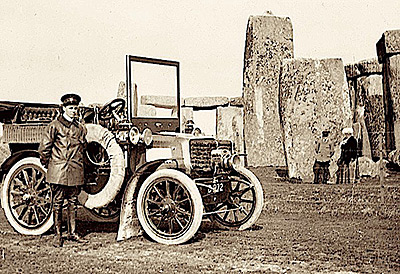
John Porter's
1902 Daimler 12HP Tonneau |
|
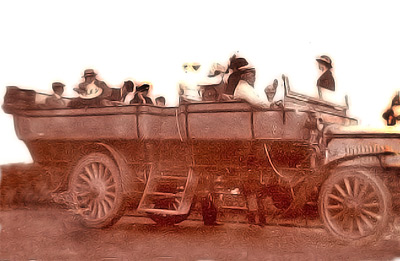
Maltby Charabanc in Folkestone
|
We are not genealogists, nor do we have experience of
tracing families, so our results in tracing John Porter are amateurish and
rather disappointing. We cannot find him in Folkestone, and we cannot find
trace of the J & G Porter company in either London or Folkestone.
Perhaps the investigation of 'the person' should be turned over by the
family to an expert.
However, it is interesting to note that if the connection between Porter
and Gilbey is correct, it does at least put them both in the same line of
business, at the same time and place. Our historical information comes
from books, magazines, the press and the internet, which is often based
on verbal history and hear-say. Our findings therefore do not guarantee
the correctness of the information.
Gilbey, 1831-1914, after returning from the Crimean
War, set up in business with his brother as a wholesale wine-merchant.
They then diversified in 1857 into retail sales of wine & spirits
which included the local London style gin. All their ventures were very
successful, moving on to owning theatres and concert halls, vineyards in
Medoc and a couple of whiskey distilleries in Scotland.
In 1872 they started distilling their own gin and by 1895 were marketing
Gilbey's Gin under their own name, with other 10 gin distilleries in other
countries. In 1893 Walter Gilbey was made a Baronet. By 1962 Gilbey's was
the largest wine and spirits company in the United Kingdom.
|
|
So back to John Edwin Porter. Family lore has that John
with his brother, George, founded the family business of Continental
Carriers which they named G&J Porter in 1878 in Folkestone. The
company specialised in the shipping of Champagne and other wines. The
company subsequently moved to London. John lived in Bromley, then
Sevenoaks Kent, and then moved to Folkestone where he built a big house
and acquired the cars. He and his wife travelled the world, leaving the
children at home with nannies.
The family lore historically continues that with the success of G & J
Porter, John became a rich man, reputedly one of the richest in Kent. He
was also an "entrepreneur". Family lore suggests he then set up
the first Bus Service in Folkestone. The busses were all painted green and
fought a successful battle against the "Yellow Bus Company" who
had set up in competition.
Some of the above items are beginning to tie in, at least
about the bus companies because of the mention of green and yellow. There
seems to have been six companies to be amongst the first in Folkestone.
None of them mention JE Porter and I cannot find any trace of a G & J
Porter in Folkestone being involved with transportation. Perhaps, as John
has been reported rich, he may have been a large investor in a bus
company rather than actually taking active part in running a charabanc
company.
|
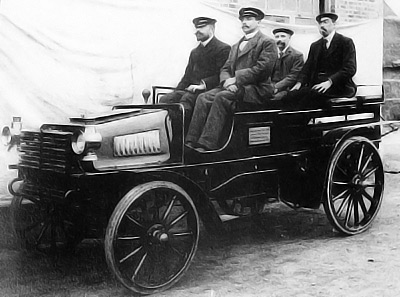
1899 LIFU Steamer Charabanc |
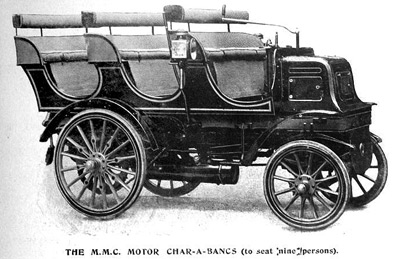 |
While we have not been very successful in finding out
where John Porter fits into the Folkstone early bus scene, we have been
very much more successful in finding out more about the history of the
early bus companies in Folkstone.
The first company operating a 'bus' in the Folkstone
district was believed to have been run by Herbert C Salter who operated a
steam powered wagonette on runs through Folkstone in a 1901, in a 1901
Lifu Steamer. This vehicle was designed by Henry House who was the
American Vice Consul in the Isle of Wight and who had previously built a
steamer in Bridgeport in 1866 before coming to UK to manage the Liquid
Fuel Engineering Co (LIFU) of Cowes. LIFU made steam vans and busses used
countrywide, but cars were made under licence by Steam Car Co Ltd of
London. A known survivor of the make is a 1901 10HP 4 seat tourer with a
2-cylinder compound engine.
Another early operator of a charabanc was a Mr Bloom of
Hythe whose driver Peter Shubsole was believed to have driven a 1904 MMC
Charabanc. Motor Manufacturing Company of Coventry (MMC) was a successor
to the Lawson's Great Carriage Car company which had shared factory with
the early Daimler UK Operation, and in 1897 was making their own cars
using the Gottlieb Daimler engine. The MMC company made a wide range of
vehicles, and competition machines, many still partaking on the Brighton
Run. MMC had gone out of business by 1908.
|
|
Soon after came another bus operator, Folkstone
Motors Ltd, started by Thomas Maltby whose son Big Jack was the driver. His
vehicle was believed to be an 8HP Daimler. Early UK Daimler history was
very complicated and more can be read at our 1902
Daimler article. Gottlieb
Daimler was one of the founders of the 'automobile' having developed his vehicle
in Canstatt in Germany. The British arm of the Daimler organisation
initially sold cars made under licence in the UK but eventually became an independent
company in its own right, - and went bankrupt!
Thomas Maltby was also the owner of the Alhambra Music Hall and was a
marine salvage contractor. Folkstone Motors had a fleet of Daimler
charabancs nicknamed 'Yellow pot/Mustad pots' which started operating
between Folkstone and Hythe.
Initial livery was blue-black with yellow panels, and eventually, mainly
yellow, - hence 'Yellow-pots'. The company was eventually taken over by
the E V Wills organisation.
_____________
An additional bus operator started at the same time called the Folkstone and
District Motor Car Co with connections to Morgan Cycle Works. Shares were
issued in the company and it was registered. A prototype vehicle was being
considered but services/vehicles never really got off the ground before the company was
wound up. |
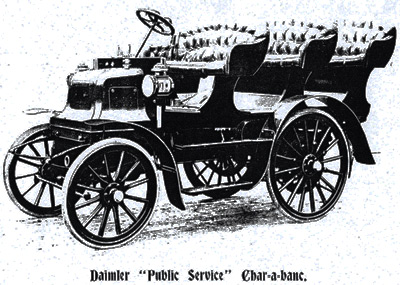 |
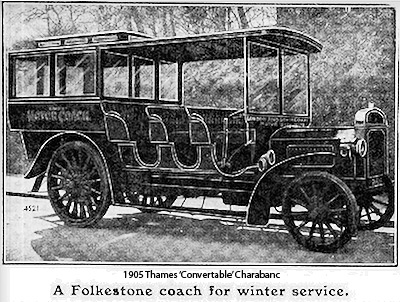 |
At about the same time Cann's Patent Motor
Coaches came into being run by John Cann, earlier a mining engineer at
Kimberley diamond mines. He started initially with a 6HP Daimler machine
but changed to a using a couple of MMC buses of 6 and 10HP.
After 1906 he purchased at least ten much bigger vehicles from 'Thames
Ironworks, Shipbuilding & Engineering Co', being 50HP six cylinder
machines, available as fully open-air charabancs, some partially covered
with the back compartment roofed and glass windowed, and some also with
the front of the vehicle having a surrey top. Livery was black/primrose
and primrose wheels, -yellowy. Company became London & South Coast
Motor Service Ltd in 1905 with Cann as MD.
'Thames Ironworks, Shipbuilding & Engineering Co', supplying the
charabancs, was based in Greenwich and had obtained in 1898 a marine
engine business. This soon successfully diversified into the motor
business, initially into vans and lorries, later into cars. Vehicles were
based on the Napier pattern for whom the designer C K Edwards had worked,
and had mainly six cylinder engines of 45 or 60 HP and higher rating. A
9.5 litre machine set the world record at Brooklands in 1907 of
76mph.
Passenger cars eventually became relatively expensive which resulted in
reduction of sales and eventual closure in 1913. A very large 1913 Thames
Stage Coach survives in the Dutch National Motor Museum. |
| Another prominent competitor started in
1903;
'Pop' or 'Father' E V Wills and his wife Rose Anne came from Chilham to
open a garage in Park Road, Cheriton. The photo with the D 1950 charabanc
(with the wording Folkstone Sandgate & Hyde Motor Services. - E V
Wills Proprietor) is of a 1905 Kent CC registered Iden Maltby Charabanc
run by Ernest Valentine Wells.
He seems to have been very sucessful and owned a number of similar vehicles for a number of years.
Ernest Wills had son, E B Wills, who later ran the Park Road Garage.
Ernest Wills subsequently took over the competitors 'Folkstone Motors' and
their 'Yellow Pots' and ran a very successful company for a number of
years. He subsequently sold out to East Kent Road Car Company in mid
1920s. Father and son died same year 1956. They had owned some 27 charabancs including Iden Maltby 30 seaters, and
Iden Maltby Sandgate Pullmans. Livery was dark green.
Iden Maltby charabancs were comprised of chassis made in Coventry by a
company owned by George Iden who had previously been working for the MMC
organisation, (mentioned above as having ties with the Daimler UK
operation). Iden Motor Car Co started 1904 and made
a number of sizes of vehicles, including later a front wheel drive
landaulette intended for Taxi work. >> |
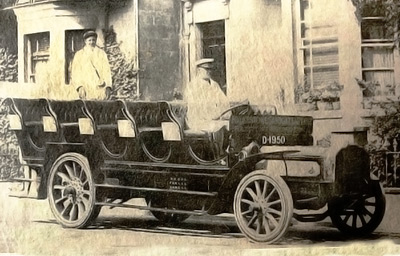
1905 Kent CC registered Iden Maltby Charabanc |
|

Charabanc by Daimler, MMC and Iden-Malby
|
D1950
Iden Maltby Charabanc above was
probably powered by a four-cylinder 18HP engine. The chassis was then
taken to Folkestone where Maltby Motors put on the body. Maltby Motors was
started by John Hugh Maltby whose smithy of 1897 had become in 1903 the
Maltby's Motor Works, a specialist coachwork company. They grew to have a
number of premises in a number of towns and eventually made their own
complete car, the Maltby Redfearn. In 1927 the business was sold to the
then MD of Walkers Whiskey Distillery, who in 1935 sold it on to the Caffyns chain. |
| To glean all the above
information required quite a lot of digging, which however nowhere in passing
mentioned the name JE Porter. We therefore regret that we have not been
able to find any connection between Mr Porter and the early Folkestone bus
operations. |
Go to Recent Venues Page
PICTURE GALLERY INDEX
|